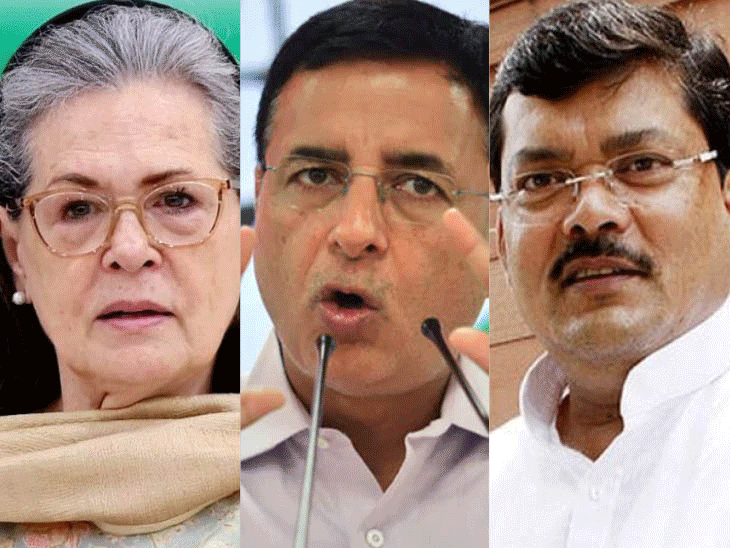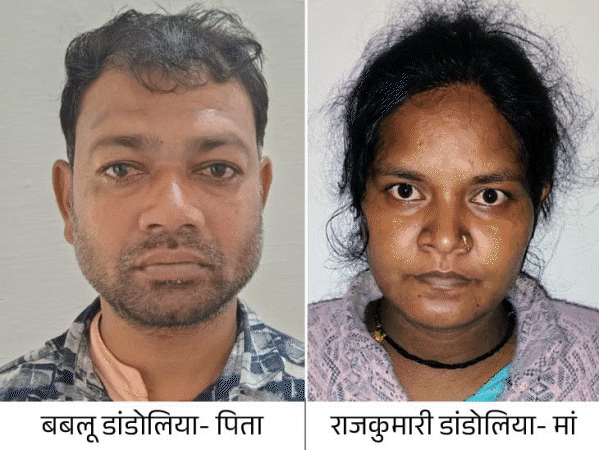Rajasthan is second after UP in North India in dynasty in politics. Here 1 out of 5 MLAs belong to a political family. Talking about men only, 15% of MP-MLAs are from political family. Every other female MLA-Sansad politics
,
This has been revealed in the report of Election Reform Association for Democratic Reforms (ADR). In the report, these facts have been revealed in the study of 234 members of the Assembly, Lok Sabha and Rajya Sabha from Rajasthan. Of these, 43 are dynasties, which are 18 percent. According to the report, the first number is from UP. There are 141 dynasties, which are 23 percent.
Read the full report…
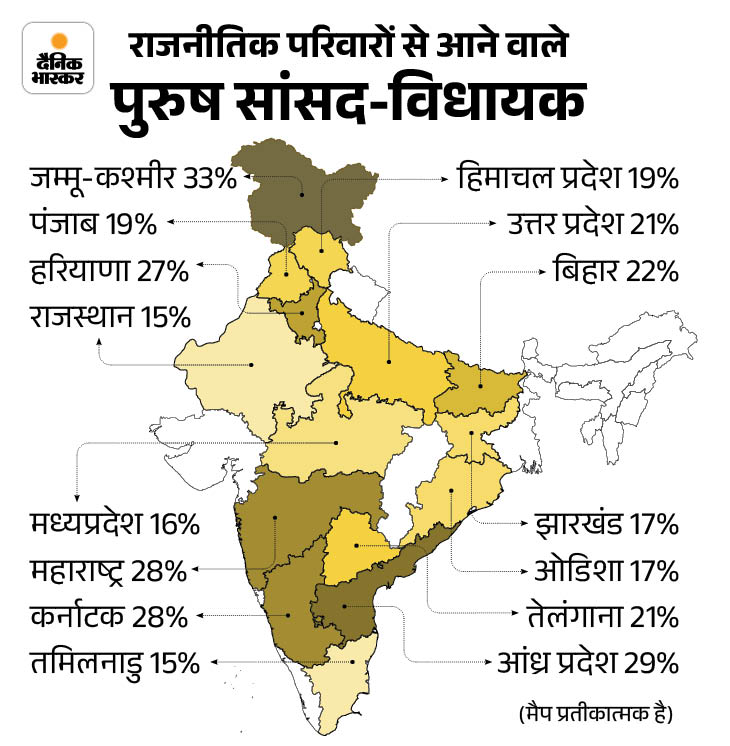
310 of 210 male public representatives and 12 out of 24 women from political families Interesting facts have been revealed in the report that 210 male MLAs in the state belong to 31 political families, which is 15 percent. However, there are many states ahead of Rajasthan in this matter. For example, 33 in Jammu and Kashmir, 29 in Andhra Pradesh, 28 in Maharashtra and Karnataka, 27 in Haryana, 22 in Bihar, 21 in Uttar Pradesh and Telangana, 21 in Punjab and Himachal Pradesh, 19 in Jharkhand and Odisha, 17 in Jharkhand and Odisha, 16 in Madhya Pradesh and 15 percent in Tamil Nadu.
50 percent familism in women’s public representatives The percentage of familism in women MLA-Sansadas is 50 percent. In Rajasthan, 12 out of 24 women leaders are from political family. However, the percentage of women leaders coming from political families in many states is more than 50. Such as 100 in Goa, 75 in Meghalaya and Arunachal Pradesh, 73 in Jharkhand, 69 in Maharashtra and Andhra Pradesh, 67 in Jammu and Kashmir, 64 in Uttarakhand and Telangana, 64 in Haryana, 60 in Haryana, 57 in Bihar, 53 in Karnataka and Madhya Pradesh, 53 in Kerala and Assam, 50-50 percent of the women come from political families.
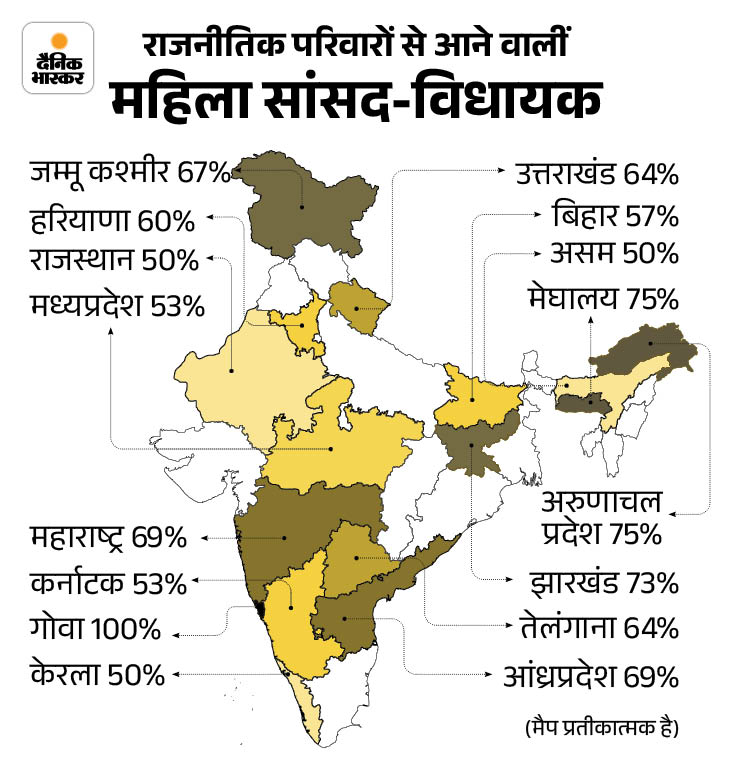
Top 3 political family in Lok Sabha in Rajasthan
- Jhalawar-Baran MP Dushyant Singh: Nani (Vijayaraje Scindia) BJP co-founder and 8 times MP, mother (Vasundhara Raje) 2 times CM and 2 times Union Minister, 6 times MLA, 5 times MP.
- Jhunjhunu MP Brijendra Singh Ola: Father (Sheesharam Ola) was a minister in MP 5 times and 8 times in MLA, state and center.
- Churu MP Rahul Kaswan: Dada (Deepchand) MLA, father (Ram Singh) MLA and 4 times MP, mother also MLA.
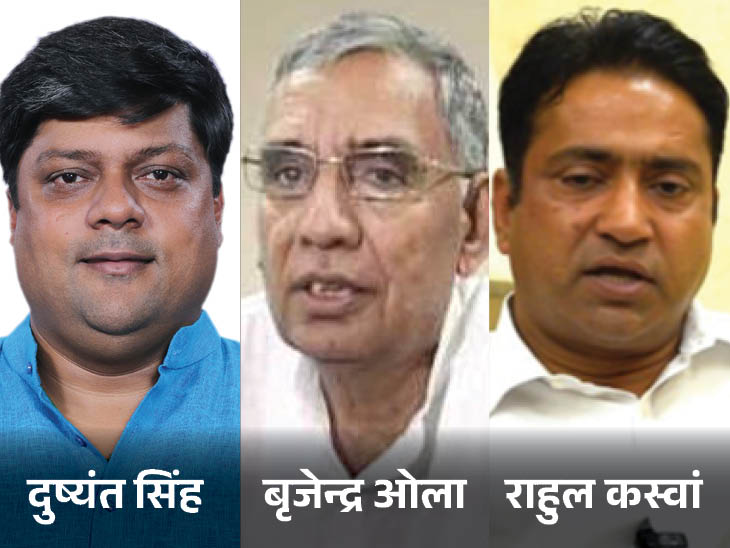
From Rajasthan to Rajya Sabha from top 3 political family
- Sonia Gandhi : Father -in -law (Jawaharlal Nehru) was the first Prime Minister, husband (Rajiv Gandhi) and mother -in -law (Indira Gandhi) of the country.
- Mukul Wasnik: Father (Balakrishna) Lok Sabha Deputy Speaker, Lok Sabha MP from 1957 to 1977 and Rajya Sabha MP from 1992 to 1998.
- Randeep Surjewala: Father (Shamsher) 4 times MLA and Rajya Sabha MP from 1992 to 1998
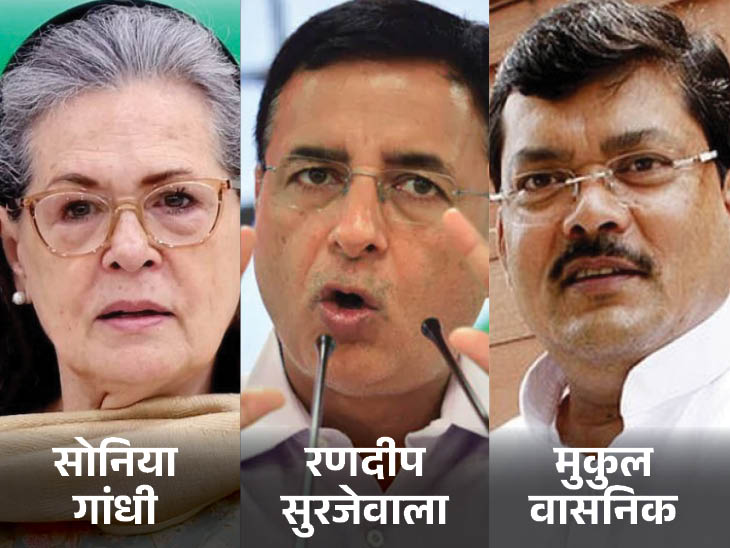
Rajasthan’s top 7 women MLA from political family
- Vasundhara Raje: Mother Vijayaraje Scindia BJP co-founder and 8 times MP
- Dr. Priyanka Chaudhary: Dada Gangaram Chaudhary Cabinet Minister and 8 times MLA
- Rita Chaudhary: Father Ram Narayan Chaudhary remains MLA 6 times
- Siddhi Kumari: Dada Karni Singh 5 times MP
- Kalpana Devi: Father Brijraj Singh 3 times MP and husband Israraj Singh MP
- Deepti Maheshwari: Mother Kiran Maheshwari cabinet minister, 3 times MLA and MP
- Shanta Meena: Husband Amritlal Meena 3 times MLA
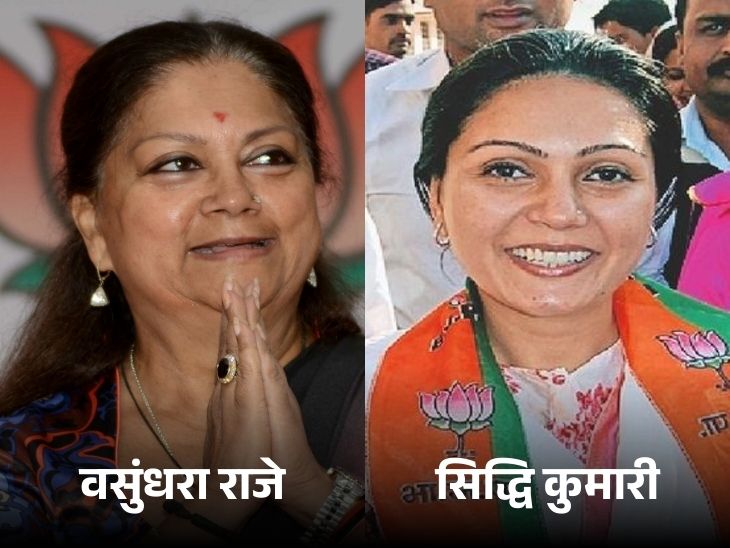
Mala political family in Rajasthan Legislative Assembly
- Tonk MLA Sachin Pilot: Father Rajesh Pilot Union Minister and MP, mother Rama Pilot MLA
- Nagaur MLA Harendra Mirdha: Dada Baldev Ram Mirdha’s father Ram was Union Minister and father Ram Niwas Mirdha was the Speaker and Union Minister
- Nadbai MLA Jagat Singh: Father Natwar Singh was Union Minister
- Srimadhopur MLA Jhabar Singh Kharra: Father Harilal Minister and 5 times MLA
- Rajkheda MLA Rohit Bohra: Father Pradyuman Singh Cabinet Minister, 7 times MLA
- Sardar City MLA Anil Kumar Sharma: Father Bhanwarlal Sharma 7 times MLA
- Sujangarh MLA Manoj Kumar: Father Master Bhanwarlal Meghwal Cabinet Minister and 4 times MLA
- Dantaramgarh MLA Virendra Singh: Father Narayan Singh Minister and 7 times MLA
- Sadulshahar MLA Gurveer Singh: Dada Gurjant Singh Minister and 4 times MLA
- Pachpadra MLA Arun Chaudhary: Father Amaram Chaudhary Minister and 5 times MLA
- Srikaranpur MLA Rupinder Singh Kunnar: Father Gurmeet Singh Kunnar 4 times MLA
- Nasirabad MLA Ramswaroop Lamba: Father Sanwarlal Jat was a minister
- Deeg-Kumher MLA Dr. Shailesh Singh: Father Dr. Digambar Singh was minister
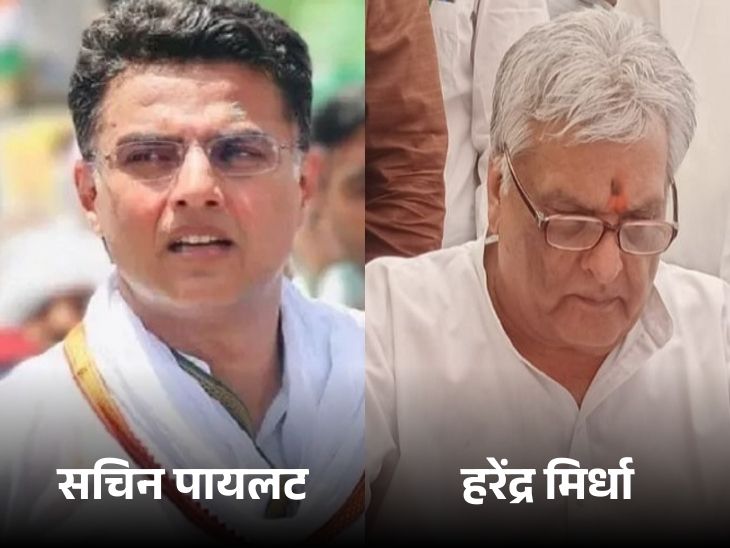
Name, influence, money and use of network, no merit base
The report said that in the politics of dynasty, there are families whose names, influences, money and network have been used by new generations. This raises questions on the politics of merit, hard work, accountability and equal representation.
The report assumes that no party has any criteria or merit basis regarding ticket distribution. This is the reason why the politics of dynasty promotes. Political families get repeated tickets, as there is a lack of democratic beliefs in political parties.
Why is dynasty flourishing According to the report, dynasty also flourishes due to ‘money and muscle power’ in the election and the ability to win. The structure of political parties is also a reason. The most powerful position in the party decides who to give tickets and who will take the party further.
There is also a lack of public accountability due to non -arrival of political parties under the Right to Information (RTI). Therefore, dynastic thinking flourishes more.
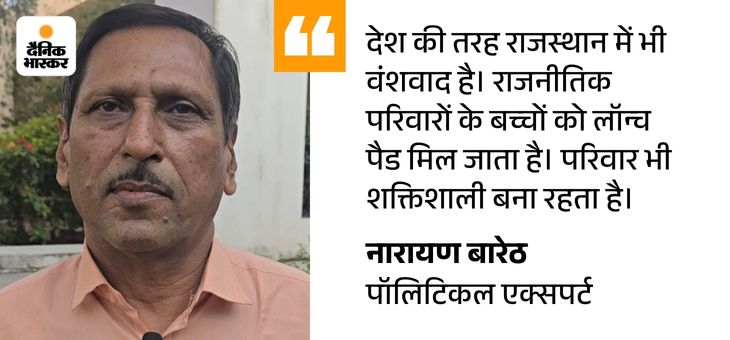
Small parties more trend The report assumes that the credit for the prevalence of dynastic political is also the strong family traditions of the country. These traditions justify dynasty in the view of voters. In India, it has been considered normal and acceptable that the father or mother wants to hand over any kind of power to his son or daughter.
According to the report, if we look at the politics of national and states, indications of dynasty politics were found in the 1970s. The data recorded in the report shows that dynasty is equally visible in all the national and regional political parties, all the states, male and women, all regional and regional. At the same time, it is quite visible in small parties. The report believed that in women and in small parties they are at high levels.
The report said that dynastic political is not only a medium to maintain heritage but also a way to maintain political entry and existence. It is also a matter of political access to the continuity of family power.
